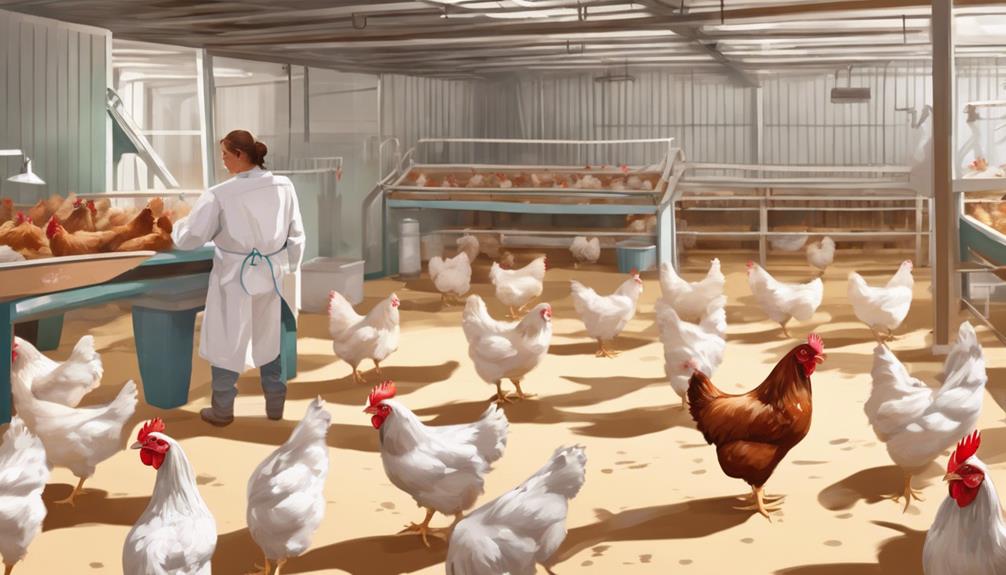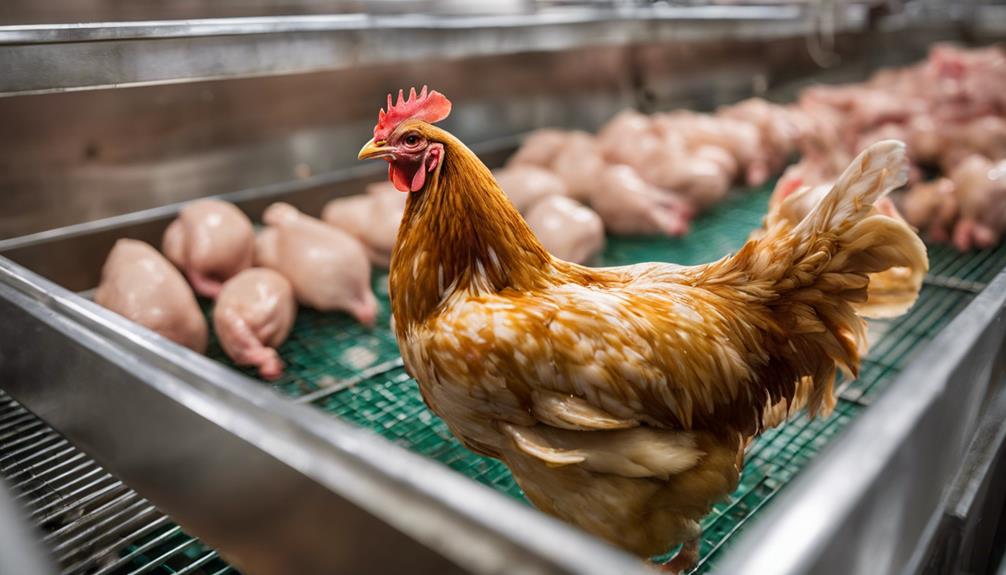Guide to Ethical Chicken Farming Practices"
In ethical chicken farming, prioritize the well-being of your chickens through understanding their behavior and providing enriching environments. Monitor health, behavior, and living conditions closely to ensure their physical and psychological needs are met. Implement sustainable practices for environmental impact and management, offering proper ventilation and enriching activities. Consistently monitor health, maintain a balanced diet, and ensure comfortable housing. Focus on disease prevention and proactive health management. Address behavioral needs by providing mental and physical stimulation. Uphold humane slaughter practices and regularly audit your farm practices for adherence to ethical guidelines. Ensure the well-being of your flock for a sustainable and ethical environment.
Ethical Standards in Chicken Farming
When considering ethical standards in chicken farming, it's crucial to prioritize the well-being of the animals above all else. Sustainable sourcing plays a vital role in ensuring that the chickens are raised in a manner that respects both the environment and the animals themselves. By sourcing feed and materials from sustainable sources, you can help reduce the carbon footprint of the farm and ensure that the chickens aren't exposed to harmful chemicals or practices.
In addition to sustainable sourcing, animal enrichment is another key aspect of ethical chicken farming. Chickens are intelligent and social creatures that require mental stimulation and space to express their natural behaviors. Providing enriching environments such as spacious coops, outdoor access, and objects for pecking and scratching can significantly improve the welfare of the chickens.
However, it's essential to go beyond just meeting the basic needs of the animals. Ethical standards in chicken farming require going the extra mile to ensure that the chickens lead happy and healthy lives. This includes providing veterinary care when needed, implementing humane handling practices, and constantly monitoring the conditions in which the chickens are raised.
Welfare of Chickens on Farms
To truly uphold ethical standards in chicken farming, the welfare of chickens on farms must be meticulously prioritized and diligently monitored. Understanding chicken behavior is crucial to ensuring their well-being. Chickens are social animals that exhibit complex behaviors such as nesting, dust bathing, and foraging. Inadequate housing conditions can lead to stress and behavioral issues among chickens. Overcrowding, lack of space, and poor ventilation can result in aggressive behavior and feather pecking within flocks.
Enrichment plays a vital role in promoting positive chicken welfare. Providing chickens with opportunities to engage in natural behaviors like perching, scratching, and pecking at objects can reduce stress and improve their overall quality of life. Enrichment items such as straw bales, hanging vegetables, and dust baths can keep chickens mentally stimulated and physically active.
Monitoring the welfare of chickens on farms requires constant vigilance. Regular health checks, observation of behavior, and maintaining clean and comfortable living conditions are essential. Farmers should prioritize creating a suitable environment that meets the physical and psychological needs of the chickens. By taking proactive steps to address housing conditions and provide enriching activities, farmers can ensure that their chickens lead healthy and content lives on the farm.
Impact of Environment on Chickens
Regularly assessing and enhancing the environmental conditions in which chickens are raised is paramount for ensuring their overall well-being and quality of life. Climate adaptation plays a crucial role in maintaining the health and productivity of chickens. Extreme temperatures can lead to stress and impact chicken behavior negatively. Providing proper ventilation, shade, and access to clean water are essential for helping chickens adapt to varying climatic conditions.
Environmental enrichment is another key aspect that significantly influences the well-being of chickens. Enriching their environment with objects like perches, dust baths, and pecking objects not only stimulates natural behaviors but also reduces stress levels. Chickens are naturally curious and active animals, and by incorporating environmental enrichment, you can prevent boredom and encourage healthy behavior patterns.
Reducing stress in chickens is vital for ensuring their overall welfare. Stress can lead to various health issues and negatively affect egg production and growth rates. By creating a calm and enriching environment, you can help chickens feel secure and content. Minimizing loud noises, maintaining proper stocking densities, and ensuring good air quality are all crucial steps in reducing stress levels among chickens.
Best Practices for Chicken Care
For optimal chicken care, prioritize consistent monitoring of their health and living conditions to ensure their well-being and productivity. Nutrition management plays a crucial role in maintaining healthy chickens. Ensure that they've a balanced diet rich in essential nutrients like protein, vitamins, and minerals. Proper nutrition not only supports their growth and development but also boosts their immune system, making them more resilient to diseases.
When it comes to housing design, create a comfortable and safe environment for your chickens. The coop should provide adequate space for movement, ventilation, natural light, and protection from predators. Clean the living area regularly to prevent the spread of diseases and parasites. A well-designed coop promotes the overall well-being of the chickens and can enhance their egg-laying productivity.
Implement biosecurity measures to prevent diseases from entering your flock. Control access to the chicken coop, sanitize equipment, and practice good hygiene when handling the birds. Regularly inspect the chickens for any signs of illness and isolate sick individuals to prevent the spread of infections. By prioritizing disease prevention, you can maintain a healthy flock and reduce the need for antibiotics or other interventions.
Managing Health in Chicken Flocks

Implementing proactive health management strategies is essential for ensuring the well-being and vitality of your chicken flocks. Disease prevention plays a crucial role in maintaining the overall health of your chickens. Regularly inspecting your flock for any signs of illness, isolating sick birds, and practicing good biosecurity measures can help prevent the spread of diseases within the flock. Additionally, proper nutrition is key to supporting the immune system of your chickens. Ensure that your flock has access to a balanced diet that meets their nutritional needs to keep them healthy and resilient against diseases.
In terms of flock management, establishing a vaccination schedule is imperative for protecting your chickens from common diseases. Consult with a veterinarian to create a vaccination plan tailored to the specific health risks in your area. Vaccinations can significantly reduce the likelihood of disease outbreaks and minimize the need for antibiotics, promoting a more sustainable and ethical approach to chicken farming.
Monitoring the health of your chicken flocks should be a continuous process. Keep detailed records of vaccinations, illnesses, and treatments to track the health history of individual birds and the overall flock. By prioritizing disease prevention, proper nutrition, and proactive flock management, you can ensure that your chickens lead healthy and fulfilling lives on your farm.
Addressing Behavioral Needs of Chickens
To ensure the well-being and contentment of your chicken flock, understanding and addressing their behavioral needs is crucial. Chickens are social creatures that thrive in enriching environments with opportunities for social interactions. Providing behavioral enrichment is essential for their mental and physical well-being, as it stimulates natural instincts and reduces stress.
One way to address the behavioral needs of chickens is by creating enriching environments within their living spaces. This can include offering perches for roosting, dust baths for grooming, and objects for pecking and scratching. These enrichments not only keep the chickens physically active but also mentally engaged, preventing boredom and negative behaviors.
Social interactions are also vital for chickens, as they establish hierarchies and build relationships within the flock. Ensure that there's enough space for all chickens to interact comfortably and that there are hiding spots for those needing a break. This will reduce aggression and promote a harmonious coexistence among the flock members.
Incorporating behavioral enrichment activities and promoting positive social interactions among your chickens won't only improve their welfare but also enhance the overall health of your flock. By understanding and meeting their behavioral needs, you're creating a more sustainable and ethical environment for your chickens to thrive.
Ensuring Humane Slaughter of Chickens

Understanding the importance of humane practices in the slaughtering process is paramount for upholding ethical standards in chicken farming. When it comes to slaughter techniques, prioritizing animal welfare should be the topmost concern. Ethical considerations must guide every step of the process to ensure that chickens are treated with dignity and respect until the very end.
Butchering methods play a crucial role in determining the level of humane treatment during slaughter. It's essential to use techniques that minimize stress and pain for the birds. Proper training of staff involved in the slaughtering process is vital to ensure that the chickens are handled with care and expertise. Implementing stunning methods that render the chickens unconscious before slaughter is a humane practice that reduces suffering.
Regular monitoring and auditing of the slaughter process are necessary to guarantee that ethical standards are consistently met. Transparency in the slaughter practices is key to building trust with consumers who value humane treatment of animals. By upholding high standards in the slaughtering process, chicken farmers can demonstrate their commitment to ethical practices and contribute to the betterment of animal welfare in the industry.
Monitoring and Auditing Farm Practices
Effective monitoring and auditing of farm practices are essential for ensuring compliance with ethical standards and promoting accountability in chicken farming operations. Farm inspections play a crucial role in verifying that farmers adhere to ethical guidelines in chicken rearing. These inspections should be thorough, frequent, and conducted by independent bodies to prevent conflicts of interest. Compliance with regulations surrounding animal welfare, environmental sustainability, and worker conditions must be carefully monitored to uphold ethical sourcing practices.
In addition to farm inspections, traceability is key to maintaining ethical standards in chicken farming. Traceability ensures that the origins and conditions in which chickens are raised can be verified throughout the supply chain. This transparency not only fosters trust with consumers but also holds farmers accountable for their practices. By tracking every step of the production process, from hatching to processing, ethical sourcing can be guaranteed.
Regular audits of farm practices are necessary to identify areas for improvement and ensure ongoing compliance with ethical standards. Audits should be comprehensive, covering various aspects such as animal welfare, food safety, and environmental impact. Farmers should view audits as opportunities for growth and learning, rather than as mere checkboxes to tick off. Ultimately, monitoring and auditing farm practices are vital tools in upholding ethical standards and driving positive change in the chicken farming industry.
Frequently Asked Questions
Are There Any Economic Benefits for Farmers Practicing Ethical Chicken Farming?
When you practice ethical chicken farming, you tap into market demand for sustainable products. This can boost your profitability as consumers perceive ethically raised chickens as a more sustainable choice.
How Do Chicken Farmers Handle Predator Control on Their Farms?
When handling predator control on your farm, chicken farmers use predator deterrents and humane methods. Instead of lethal strategies, farmers opt for non-lethal approaches to protect their chickens while promoting wildlife conservation.
What Measures Are in Place to Prevent Disease Outbreaks Among Chickens?
To prevent disease outbreaks among chickens, you must strictly follow biosecurity protocols. These include controlling access to your farm and ensuring proper sanitation. Implement effective vaccination strategies to boost immunity.
Avoid overusing antibiotics to prevent antibiotic resistance and disease transmission. By being proactive and vigilant, you can safeguard your chickens' health and well-being, ultimately ensuring a thriving flock.
Do Ethical Chicken Farms Provide Enrichment Activities for Chickens?
Ethical chicken farms prioritize chicken behavior and welfare by providing environmental enrichment activities for stress relief. These activities can include opportunities for natural behaviors like pecking, scratching, and dust bathing, which are essential for the mental and physical well-being of chickens.
Ensuring that chickens have access to enrichment helps prevent boredom and behavioral issues, ultimately leading to healthier and happier birds on the farm.
How Do Farmers Ensure the Proper Disposal of Chicken Waste to Protect the Environment?
To ensure proper waste management and protect the environment, you must implement efficient disposal methods for chicken waste. This includes composting, anaerobic digestion, or proper storage to prevent contamination.
Regular monitoring and following regulations are crucial for environmental protection. By responsibly handling chicken waste, you contribute to sustainable farming practices and safeguarding the ecosystem.
Conclusion
You have the power to make a difference in the lives of chickens by choosing to support ethical farming practices.
By prioritizing their welfare, health, and behavioral needs, you can ensure that these animals are treated with the respect and care they deserve.
Remember, every choice you make as a consumer can have a significant impact on the lives of these vulnerable creatures.
Choose compassion over convenience and be a voice for the voiceless in the farming industry.
